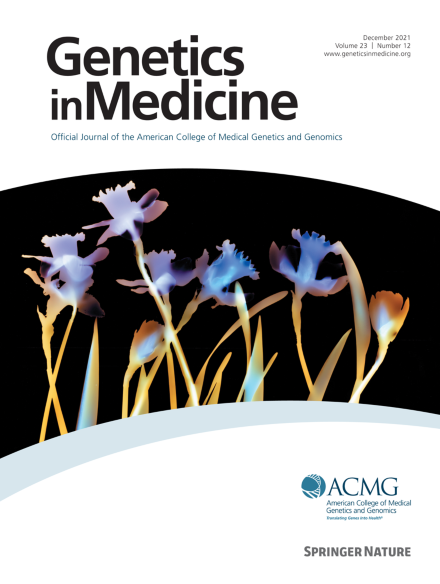Using cancer phenotype sex-specificity to enable unbiased penetrance estimation of SMARCA4 pathogenic variants for small cell carcinoma of the ovary, hypercalcemic type (SCCOHT)
IF 6.6
1区 医学
Q1 GENETICS & HEREDITY
引用次数: 0
Abstract
Purpose
Small cell carcinoma of the ovary, hypercalcemic type (SCCOHT) is an extremely rare, highly aggressive cancer (mean age of onset, 24 years). Nearly all cases are associated with somatic or germline pathogenic variants (GPVs) in SMARCA4. Early bilateral oophorectomy is recommended for unaffected females with a SMARCA4 GPV. However, the penetrance of SMARCA4 GPVs for SCCOHT is highly uncertain and subject to ascertainment bias.
Methods
Leveraging the early-onset, sex-specific, highly morbid nature of SCCOHT, we hypothesized that the penetrance for SCCOHT could be quantified from the deficit in SMARCA4 GPVs in females compared with males in UK Biobank, a population cohort for which recruitment was restricted to those age 40 to 69. We also analyzed pedigrees ascertained internationally by the Montreal-based SCCOHT-SMARCA4 Registry.
Results
We observed SMARCA4 GPVs in 8/210,182 (0.0038%) female and 18/179,210 (0.0100%) male participants in UK Biobank (P = .028), representing a male:female odds ratio of 2.64 (95% CI 1.09-7.02), implying a penetrance of 62% for SCCOHT (given the absence of other SMARCA4-related female-specific early morbid diseases). A deficit of GPVs in females in UK Biobank was also demonstrated for BRCA1 and TP53.
Conclusion
Our findings support bilateral oophorectomy in early adulthood as a rational choice for at-risk females with SMARCA4 GPVs.
利用癌症表型的性别特异性,对卵巢高钙型小细胞癌(SCCOHT)的SMARCA4致病变体进行无偏见的渗透性评估。
目的:高钙血症型卵巢小细胞癌(SCCOHT)是一种极其罕见、侵袭性极强的癌症(平均发病年龄为 24 岁)。几乎所有病例都与 SMARCA4 的体细胞或种系致病变体 (GPV) 有关。建议患有 SMARCA4 GPV 的未受影响女性及早进行双侧输卵管切除术。然而,SMARCA4 GPV对SCCOHT的穿透性还很不确定,并且存在确定偏差:利用 SCCOHT 发病早、性别特异性强、发病率高的特点,我们假设可以通过英国生物库(UK Biobank)中女性与男性相比 SMARCA4 GPV 的缺失情况来量化 SCCOHT 的渗透性。我们还分析了位于蒙特利尔的 SCCOHT-SMARCA4 注册中心在国际上确定的血统:在英国生物库中,我们在8/210,182(0.0038%)名女性参与者和18/179,210(0.0100%)名男性参与者中观察到SMARCA4 GPVs(p = 0.028),男女几率比例为2.64(95%CI 1.09-7.02),这意味着SCCOHT的渗透率为62%(考虑到没有其他与SMARCA4相关的女性特异性早期发病疾病)。在英国生物库中,BRCA1 和 TP53 的女性 GPVs 也有缺陷:我们的研究结果支持在成年早期对患有 SMARCA4 GPV 的高危女性进行双侧输卵管切除术。
本文章由计算机程序翻译,如有差异,请以英文原文为准。
求助全文
约1分钟内获得全文
求助全文
来源期刊

Genetics in Medicine
医学-遗传学
CiteScore
15.20
自引率
6.80%
发文量
857
审稿时长
1.3 weeks
期刊介绍:
Genetics in Medicine (GIM) is the official journal of the American College of Medical Genetics and Genomics. The journal''s mission is to enhance the knowledge, understanding, and practice of medical genetics and genomics through publications in clinical and laboratory genetics and genomics, including ethical, legal, and social issues as well as public health.
GIM encourages research that combats racism, includes diverse populations and is written by authors from diverse and underrepresented backgrounds.
 求助内容:
求助内容: 应助结果提醒方式:
应助结果提醒方式:


